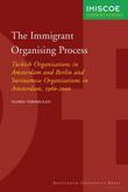Explore

The Immigrant Organising Process
Floris Vermeulen
2006
This study focuses on the emergence and persistence of immigrant organisations in host societies. The relevance of immigrant organisations for both the host society and the immigrants themselves has been effectively demonstrated in many different studies. However, the question why immigrant organisations emerge and why they often persist over a long period is not adequately answered. In this study a comparative approach is used to reveal the structural determinants of the immigrant organising process. Different theoretical perspectives are combined (immigration model, social movement theory and the organisational ecology model). It is this combination of models, which has not yet been done by other scholars, which determines the value of this study and the contribution to a better understanding of the immigrant organising process. A comparative method is used, analysing Turkish organisations in Amsterdam and Berlin and Surinamese organisations in Amsterdam (1960-2000), to explain the way in which the three explanatory models can be combined in one coherent explanation.
This book is included in DOAB.
Why read this book? Have your say.
You must be logged in to comment.
Rights Information
Are you the author or publisher of this work? If so, you can claim it as yours by registering as an Unglue.it rights holder.Downloads
- 215 - pdf (CC BY-NC) at OAPEN Library.
Keywords
- 20th century
- Amsterdam
- Berlin
- Immigrant organisations
- Integration policy
- Mathematics & science
- Migration, immigration & emigration
- Organisational ecology
- Political opportunity structure model
- popular science
- Science: general issues
- Social issues & processes
- Society & culture: general
- Society & Social Sciences
- Surinamese
- thema EDItEUR::J Society and Social Sciences::JB Society and culture: general::JBF Social and ethical issues::JBFH Migration, immigration and emigration
- thema EDItEUR::P Mathematics and Science::PD Science: general issues
- Turks
- Wetenschap algemeen
Links
DOI: 10.5117/9789053568750Editions

